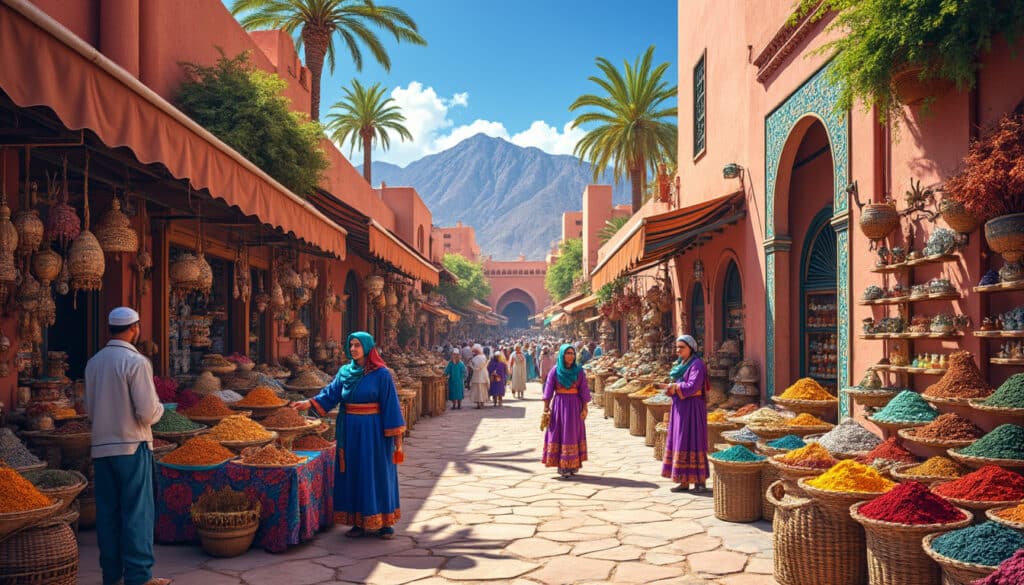Marrakesh, a city bursting with energy and colors, serves as a monumental reflection of centuries of history and blending of cultures. Known for its unique architecture, Marrakesh embodies a fusion of Islamic, Berber, and French colonial styles that delightfully merge to tell a story of its vibrant past and eclectic present. Everywhere you look, from the maze-like medinas to lavish gardens and modern establishments, the city’s architectural wonders provide a window into Morocco’s complex identity.
The Historical Influence of Islamic and Berber Architecture in Marrakesh
Marrakesh’s architectural landscape is primarily shaped by rich Islamic and Berber heritage, evident in the grand mosques, medinas, and palatial structures that dot the city. These architectural styles were chiseled meticulously through time, reflecting the religious and cultural ethos of their periods.
Islamic architecture is showcased in numerous mosques throughout the city, with the famous Koutoubia Mosque leading the charge. Not only does it serve religious purposes, but its minaret is a beacon for those exploring the city. The mosque stands as a testament to Islamic architectural prowess, with intricate geometric patterns and calligraphy adorning its surfaces.
The influence of the Berber people is intricately woven into the fabric of Marrakesh’s architecture. The mashrabiya and traditional tilework, notably seen in old riads, echo their sophisticated artistry and craftsmanship. Berber architecture focuses on blending seamlessly with the environment, using local materials and muted palates reminiscent of the surrounding landscapes.
- ✨ Mashrabiya Screens: Provide shade while allowing breezes
- ✨ Zellige Tilework: Symbolizes infinity with geometric complexity
- ✨ Earthen Walls: Integrate seamlessly into natural settings
The fusion of these styles creates a dynamic urban tapestry, with Islamic motifs providing a sacred undertone, while Berber styles add an earthy, grounded feel.

The Role of Medinas as Cultural Hubs
A pivotal element in Marrakesh’s urban design is the medina, offering a labyrinthine network of alleys bustling with life. Historically, medinas functioned as the societal core, hosting vibrant souks where trade in spices, textiles, and artisanal goods thrived. The medina’s narrow alleyways cater to pedestrian traffic and donkey carts rather than motor vehicles, preserving its charm.
It is here that one can truly feel the pulse of Marrakesh, as the scents of saffron and mint waft through the air and the chorus of bartering lures visitors deeper into this enchanting maze. Detailed tilework and ornate arches often embellish the entrance to these alleyways, demarcating transitions from one area to the next and showcasing where Marrakesh seamlessly blends past with present.
The French Colonial Influence on Marrakesh’s Urban Landscape
The early 20th century saw the arrival of the French, whose colonial footprint left an indelible mark on Marrakesh’s architecture. They brought architectural concepts that harmonized with the Moroccan aesthetic, blending styles to create a unique urban fabric. The influence is most vividly visible in the district of Gueliz, where wide boulevards, arcades, and terraces evoke the grandeur of French design.
French architects introduced elements that emphasized open spaces, as seen in Marrakesh’s expanded road networks and public squares. The French also set the stage for an evolution in residential design, shifting from traditional courtyard-centered homes to more open styles that blended indoor and outdoor living.
- 🌟 Arcades and Boulevards: Create open, sunlit public spaces
- 🌟 French Windows: Enhance light and openness in buildings
- 🌟 Terracotta Roofs: Honor the local clay traditions
Notable structures, such as the French Consulate and Majorelle Garden, serve as reminders of this colonial heritage, fusing European flair with Moroccan artistry.
Sustaining Architectural Heritage in a Modern World
The constant evolution of Marrakesh necessitates careful preservation efforts to maintain its diverse architectural legacy. This is vividly exemplified by historical preservation projects throughout the city, such as the restorative work on structures like the Musée Yves Saint Laurent Marrakesh which continues to resonate with cultural narratives.
Marrakesh effortlessly juxtaposes its past with its future, presenting a canvas where historic preservation and contemporary architecture coexist harmoniously. The city’s urban planners face the challenge of sustaining architectural integrity while accommodating burgeoning modernity.
Marrakesh’s Iconic Structures: A Visual Odyssey
To truly grasp Marrakesh’s architectural grandeur, one must explore its iconic structures, each narrating a story of its era and design ethos. Buildings like the Bahia Palace with its opulent courtyards and the Ben Youssef Madrasa with its intricately carved woodwork reveal an awe-inspiring depth of craftsmanship.
The Majorelle Garden, once a sanctuary for renowned artist Jacques Majorelle, today stands as an epitome of Marrakesh’s botanical elegance infused with Art Deco elements, reflecting the influence of European aesthetics. Public exploration spaces like the Koutoubia Mosque offer a glimpse into spiritual and community life, standing as both landmarks and hubs for cultural gatherings.
- 🌿 Bahia Palace: Exudes regal elegance with expansive gardens
- 🌿 Koutoubia Mosque: Symbolizes spiritual and communal unity
- 🌿 Majorelle Garden: Merges botanical beauty with artistic heritage
Marrakesh’s Sustainable Architecture Initiatives
Architects in Marrakesh are increasingly embracing sustainable practices, merging tradition with eco-friendly technologies. The COP22 Village is a stellar example, showcasing innovative approaches such as using local materials that maintain the aesthetic integrity of the area while employing green technologies.
The city is a pioneer in smart urban planning, aiming to balance modernization with sustainability. Efforts like the implementation of solar energy systems and natural ventilation bode well for the environmental consciousness of Marrakesh’s architectural future.
Integration of Hospitality and Cultural Traditions in Marrakesh
The hospitality sector in Marrakesh is deeply intertwined with the city’s architectural heritage, with luxury hotels and riads reflecting traditional Moroccan artistry. Venues like the Royal Mansour and La Mamounia boast exquisite Zellige tiling and lavish interiors with traditional Moroccan patterns, providing guests with an immersive cultural experience.
Modern establishments such as Maison MK and the Hivernage Hotel & Spa strive to combine authentic Moroccan elements with contemporary comforts, offering unique spaces that cater to eclectic tastes while preserving local aesthetics.
- 🏨 Riad Kniza: Offers authentic Moroccan stay experiences
- 🏨 Palais Namaskar: Marries opulence with traditional designs
- 🏨 Ksar Char-Bagh: Reflects Berber traditions in luxurious settings
The question remains on how these establishments continue to innovate while respecting Marrakesh’s architectural legacy, creating a seamless integration between hospitality and cultural enrichment.
Preserving Culinary and Cultural Heritage
Marrakesh’s commitment to culture extends beyond architecture into its food, celebrating a culinary identity steeped in history. French colonial influence further diversified local cuisine, evident in the blend of culinary techniques. This culinary fusion has enriched Marrakesh, attracting food enthusiasts from around the world to experience the connate flavors.
To savor this experience, visitors can explore authentic dishes like traditional couscous and tagines, influenced by both Moroccan and French taste profiles.
Preserving this fusion of culture and cuisine is vital for Marrakesh’s identity, ensuring that the stories told through both its architecture and culinary traditions remain vibrant and compelling.
FAQ
- ❓ What defines Marrakesh’s architectural style? Marrakesh is known for its blend of Islamic and Berber elements with French colonial influences, creating a unique architectural identity.
- ❓ What are must-visit architectural landmarks in Marrakesh? Notable sites include the Koutoubia Mosque, Bahia Palace, and Majorelle Garden, each offering distinct historical insights.
- ❓ How does Marrakesh integrate sustainability with tradition? Marrakesh embraces modern eco-friendly practices within its construction while preserving traditional design elements, such as using local materials.
- ❓ What role do medinas play in the urban fabric? Medinas serve as cultural and economic centers, known for their labyrinthine streets, vibrant souks, and traditional architecture.
- ❓ How can visitors experience Marrakesh’s unique culture? Visitors can immerse themselves in the city’s culture through its architecture, culinary experiences, and engagement with local artisans in its bustling souks.

Fun Facts & Curiosities About Marrakesh
Marrakech, the enchanting “Red City” of Morocco, is like a multifaceted jewel that gleams under the North African sun. With its rich history, colorful culture, and architectural marvels, the city is a place where the past and present coexist in…
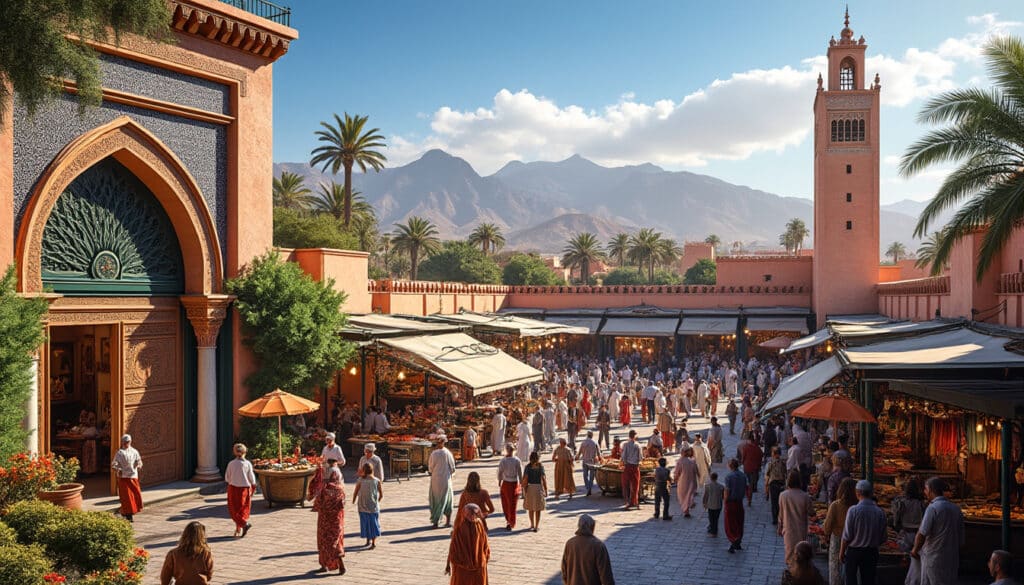
Marrakesh, often called the “Red City,” is a bustling hub of culture and history in Morocco that enchants visitors with its vibrant medinas, stunning architecture, and rich heritage. Nestled at the foothills of the Atlas Mountains, this city is not…
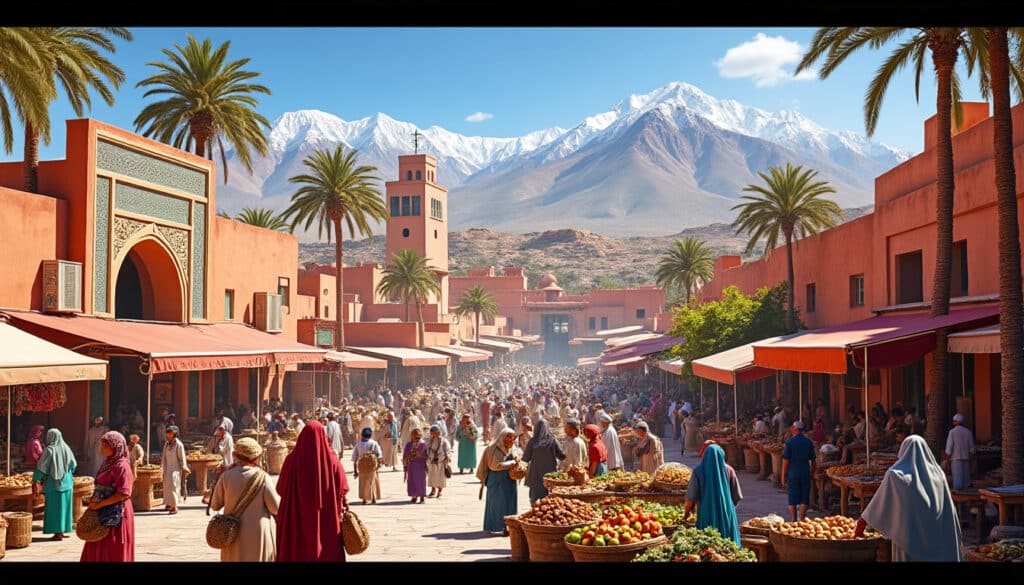
Demographics and geography of Marrakesh
Marrakesh is one of the most vibrant cities in Morocco, a hub of culture, history, and geographical diversity. Located at the foothills of the Atlas Mountains, this city boasts a unique blend of traditional and modern influences that reflect in…
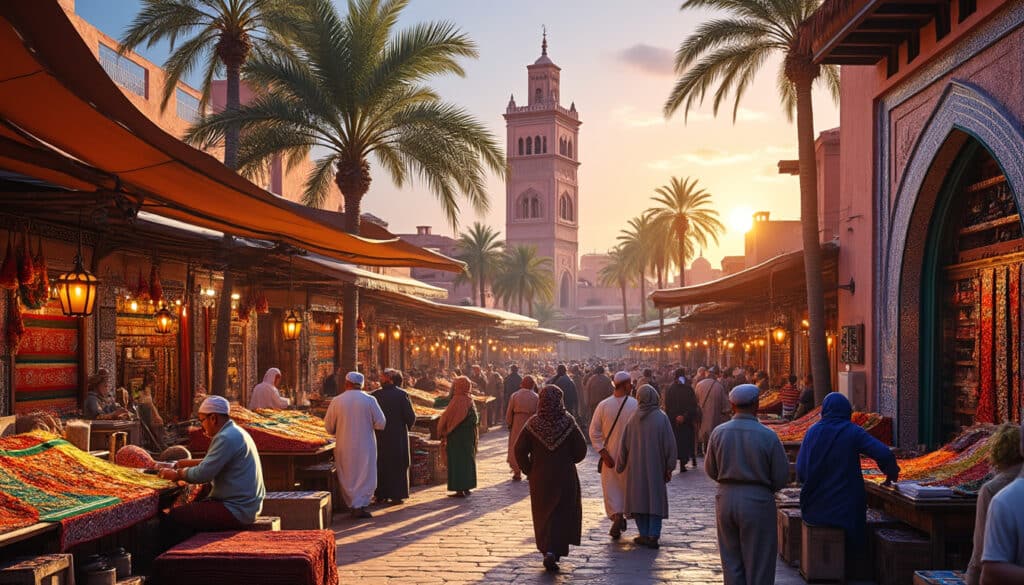
The Origins of Marrakesh: Birth of the Red City Founded in the mid-11th century, Marrakesh is a city steeped in rich history. Originally established as a military camp by the Almoravid dynasty, a confederation of Berber tribes, Marrakesh quickly evolved…
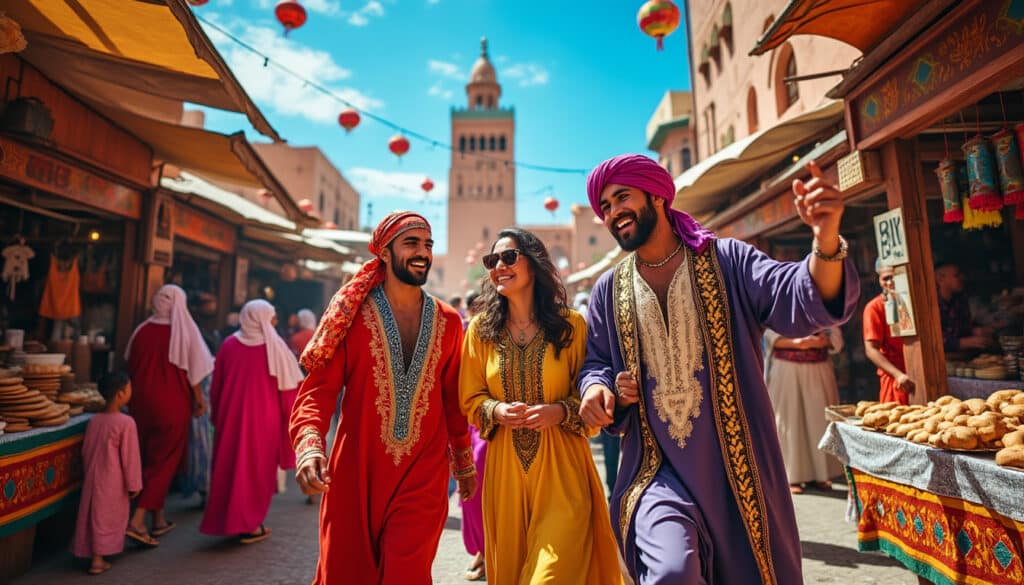
Holidays and celebrations in Marrakesh
Immerse yourself in the vibrant tapestry of Marrakesh, a city brimming with an extraordinary array of holidays and celebrations. From the bustling souks to historic landmarks like the Koutoubia Mosque and the enchanting Majorelle Garden, Marrakesh offers a captivating backdrop…
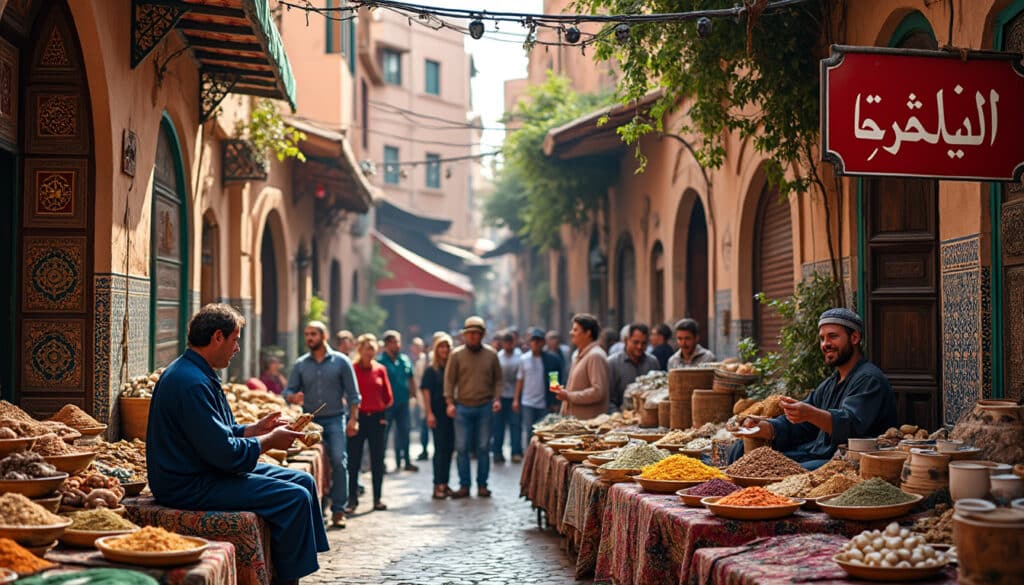
Language and spelling of Marrakesh
The city of Marrakesh, often also spelled as Marrakech, is more than just a destination known for its vibrant souks and stunning palaces. It’s a melting pot of cultures, languages, and history that reflect the dynamic interplay of evolution and…
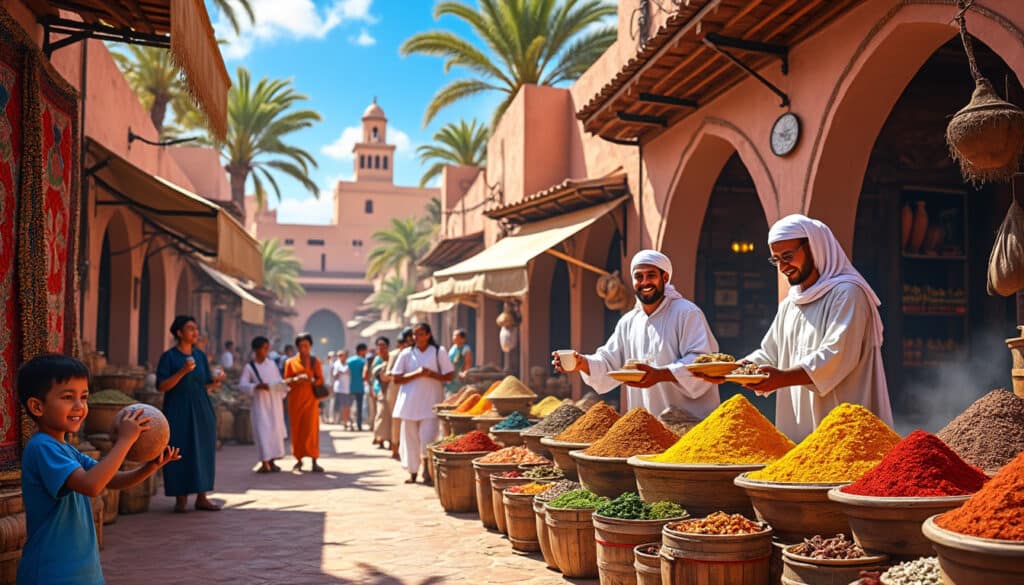
Local tips for tourists in Marrakesh
Marrakech, the captivating heart of Morocco, enchants visitors with its vibrant souks, stunning palaces, and aromatic cuisine. Known as the “Red City” due to its distinctive ocher walls, Marrakech offers a whirlwind of sensory delights that can both overwhelm and…
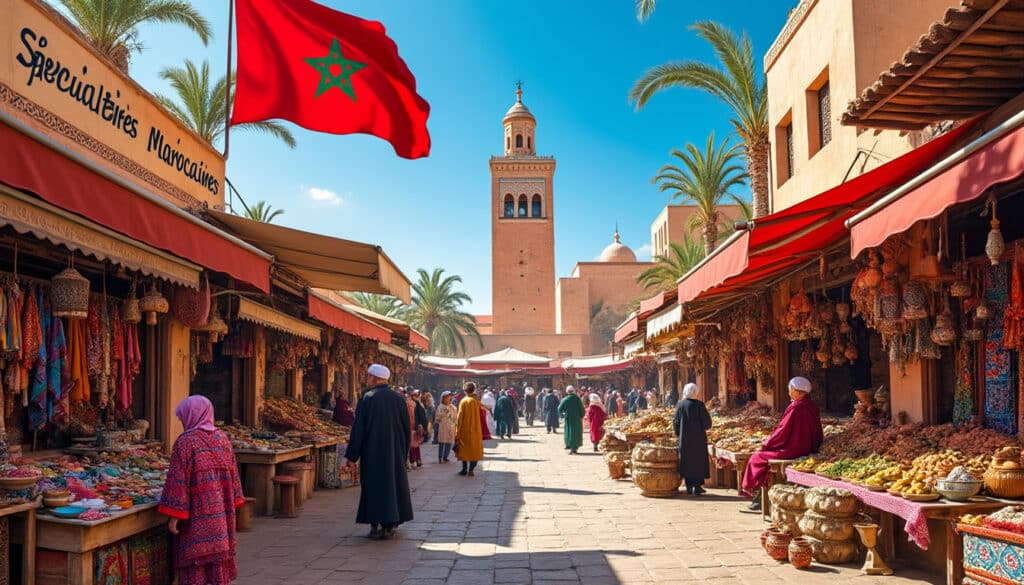
Names, flags, and identity of Marrakesh
Marrakesh, a city steeped in history and vibrant culture, is a tapestry of visual and symbolic elements that resonate with both locals and visitors alike. Known as the “Red City,” Marrakesh is an enchanting fusion of ancient traditions and modern…
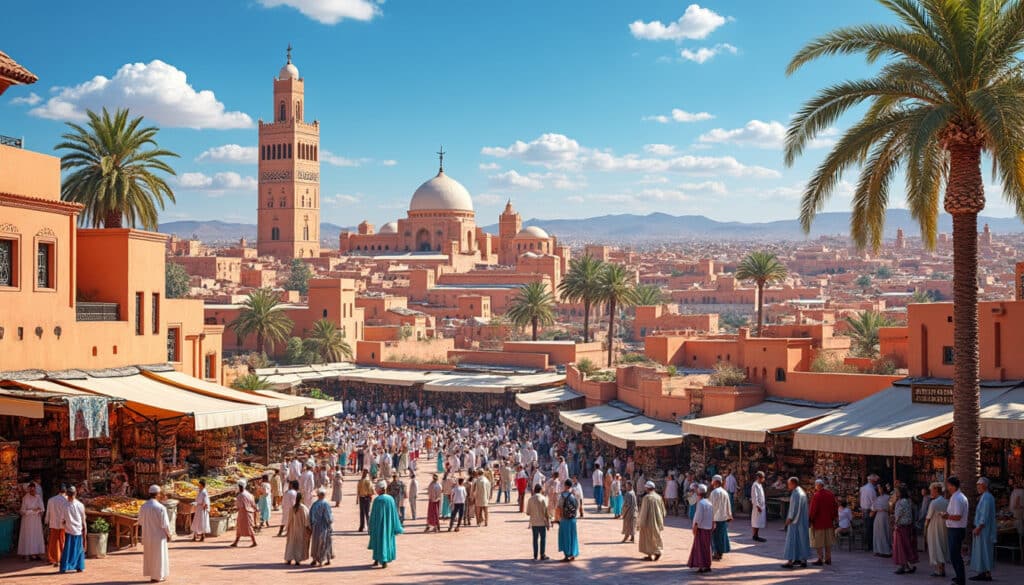
Reputation and identity of Marrakesh
Marrakesh, the “Red City” of Morocco, is a symphony of history, culture, and sensory experiences, where ancient traditions and modern lifestyles coexist beautifully. The city, with its vibrant marketplaces and iconic landmarks, offers a fascinating insight into Moroccan life. Each…
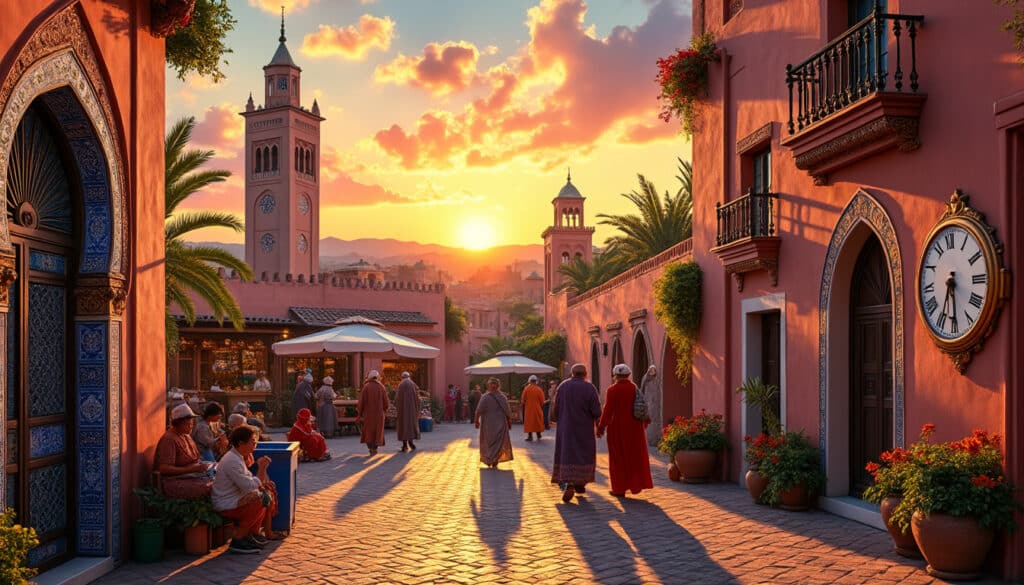
Time and time zone in Marrakesh
Marrakesh, a vibrant blend of history and culture, is a destination that attracts countless travelers every year. Whether you’re planning to experience the labyrinthine souks or explore its majestic palaces, understanding Marrakesh’s local time and timezone is essential for making…

Unusual facts and social issues in Marrakesh
Marrakesh, the captivating “Red City” of Morocco, is not only renowned for its vibrant souks and stunning architecture, but also for its unique blend of cultural and social dynamics that make it a hub of intrigue and diversity. Known for…

What does Marrakesh look, smell, feel like?
Known as the “Red City,” Marrakesh captivates all who visit with its sensory tapestry, created by the intertwining of sights, sounds, smells, flavors, and textures. A city known for its vivid colors, historical richness, and cultural diversity, Marrakesh draws explorers,…


